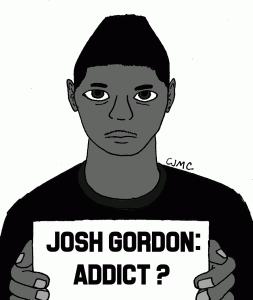Embattled Cleveland Browns wide receiver Josh Gordon recently published a calm but clearly frustrated personal essay in which he thanked various talking heads in the sports world for their concern while also chastising them for what he believed to be uninformed claims. Stephen A. Smith and others have publicly called Josh Gordon an addict, publicly worrying whether or not Gordon would “die” if he “keeps going on this road he’s going.”
Former addict Cris Carter, who has credited coach Buddy Ryan with saving his life by cutting him from the Philadelphia Eagles, remarked that he thought the same treatment would do Gordon well.
You can see why this would be frustrating. As Gordon writes so frequently throughout the essay, these men don’t even know him. Smith has even shown outright disregard for Gordon as a human being throughout it all. After Gordon’s July DWI arrest, Smith announced that he had “no sympathy” for Gordon. Who are they to call him an addict?
Gordon makes a lot of good points in his essay. He wonders aloud why he hasn’t gotten credit for abstaining from alcohol while playing for a league that makes “hundreds of millions” off of beer sponsorships. He rightfully calls out Smith for his complete lack of understanding and questions the motives of NFL fans who can safely tweet with callous impunity while making fun of his failed drug tests.
All this said, I think Josh Gordon might be an addict. But the word “addict” is not meant to be an insult. Being an addict does not make you a degenerate, nor does it imply you are weak. It does not say you are irresponsible. Being an addict is having a disease that you have a great amount of difficulty controlling.
Gordon writes, “Yes, I have a ‘problem,’ but it’s not the one all you seem to think it is.” He states that his only “problem” is that other people claim that he has one.
He admits that he’s made a laundry list of mistakes, and yet, as each “wrong choice” and “inadvertent” inhalation piles up, you start to sense a theme. He asserts over and over again that he is not an addict, and yet, he also recounts a story of his inability to abstain from a drink that he knew could cost him his career.
When Smith uses the term “addict,” he’s making a judgment on Gordon’s character, and Gordon takes that as an insult, which is a perfectly reasonable reaction. But with what we know about addiction in 2015, couldn’t we acknowledge that expressing concern over what appears to be addiction is not a character indictment, but a legitimate concern for someone’s well-being?
I think Gordon is also upset at what can be perceived as a sort of pity. In his essay, he discusses his time growing up without a father in impoverished homes, the sort of young black man that people are apt to slap labels on, warranted or not. Carter and Charles Barkley express paternalistic concern, and you can see how that could seem condescending to Gordon.
“Who do these people think they are? Why do talk they about me like I’m a child that needs a timeout?”
Josh Gordon is 23 years old. He is entitled to make mistakes and just as entitled not to be judged solely based on those mistakes. But, he’s also someone whose mistakes have been patterned and consistent with a certain type of illness that is not at all shameful to admit to having.
Addiction shouldn’t be a curse word, even though Stephen A. Smith and those of his ilk intend for it to be that way. Josh Gordon begs us to reconsider our somewhat ill-informed views on him: we don’t really know him. And it’s true–we don’t know him, and most likely never will. But you don’t need to know someone personally to let them know that they might have a problem.
At the end of the day, the language of addiction should be one of compassion, not one of indictment.
Bernstein is a member of the class of 2018.



